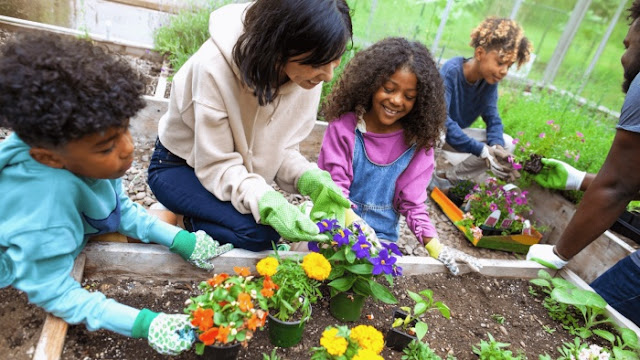
Montgomery County’s Fiscal Year 2023 (FY23) Resident and Community Food Gardening Grant Program recently presented 10 awards totaling $100,000 in funding to expand resident and community food production capacity. The awards, ranging from $5,000 to $15,000, represent partnerships in the faith community, urban agriculture, neighborhood associations, academic institutions and community health services.
The funding reflects priorities established in the FY23 County operating budget to increase food security and support initiatives that will expand local food production through home and community farming and gardening.
The funded projects will help to promote food sovereignty, healthy living, civic engagement and racial and social justice by creating opportunities for residents to cultivate their own food sources, thereby increasing access to affordable and culturally diverse food. These efforts will contribute to reduced transportation emissions and community resilience in the face of climate-related supply chain disruptions.
Residents participating in the proposed projects —including Montgomery College students, seniors, adults with disabilities and families with young children, many of whom may have experience living with food insecurity and diet-related disease—will have the opportunity to grow fresh, nutritious food that meets their unique needs. Each of the awarded organizations also aim to offer education opportunities related to healthy food access and connect neighbors around sharing resources and tips on at-home food production.
“By increasing food production in our County, these grants will critically strengthen our community resilience and support thousands of residents who are struggling to put food on the table,” said County Executive Marc Elrich. “These innovative and strategic grant investments will directly expand the ability of County residents to grow their own food, which has extensive and diverse benefits, including addressing the impact of climate change. ”
The 10 organizations that received funding, and the associated projects, are:
- Clifton Park Baptist Church: Partnering with volunteers, including local high school students, to establish a community garden with more than 500 culturally diverse plants.
- Community Health and Empowerment through Education and Research (CHEER): Increasing shared gardening spaces by roughly 20 percent resulting in capacity to grow approximately 1,500 pounds of produce for distribution in the Long Branch community.
- Crossway Community, Inc.: Augmenting and repairing existing raised garden beds to support resident gardening for the surrounding Kensington View neighborhood.
- Family Learning Solutions, Inc.: Expanding the “Food Grown Home” program to offer education and resources to youth participants, who will lead urban agriculture efforts at their Gaithersburg Middle School and Albert Einstein High School.
- HarvestShare, Inc.: Establishing a “Grow to Donate” garden that will benefit a community-based food assistance partner organization.
- Head Injury Rehabilitation and Referral Services, Inc.: Building new gardening infrastructure at several group homes and enhancing the existing community garden with high quality soil and compost, new raised beds, and tools.
- IMPACT Silver Spring: Creating a “Serenity Community Garden” within the publicly accessible Glenmont Forest Neighborhood Park.
- Inwood House Development Corporation: Installing 36 raised garden beds, including 18 that are ADA/UFAS compliant, to benefit 50 households.
- Takoma Park Mobilization: Establishing a food forest at the Montgomery College Takoma Park/Silver Spring campus, engaging students in the planting and stewardship of the food forest and providing food to students experiencing food insecurity.
- The Charles Koiner Center for Urban Farming, Inc.: Establishing a half-acre community-based education farm at A. Mario Loiederman Middle School to support food access amongst families in Wheaton.
Grant applications were evaluated by a panel of five subject matter experts, coordinated by the County’s Office of Food Systems Resilience, Department of Environmental Protection and the Office of Grants Management. Awards were determined based on applicants’ ability to provide resident access to yard, patio and community gardening supplies, space and equitable food production education opportunities, while also increasing the supply of culturally appropriate foods and leveraging relationships within the local food system. Funding was prioritized for nonprofit organizations with a history of equity, diversity and inclusion in their programming background.
